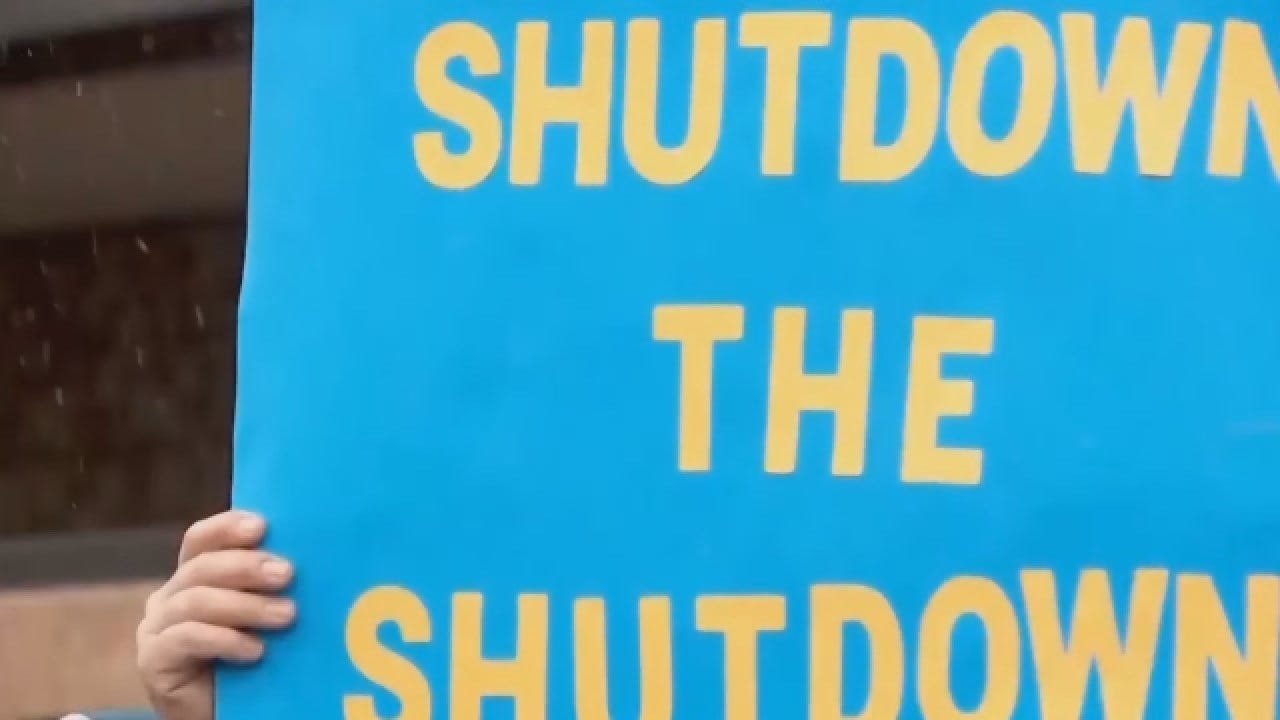Poll: Majority Of Americans Think Trump Should End Shutdown Without Border Wall Funding
Seven in 10 Americans don't think the issue of a border wall is worth a government shutdown, which they say is now having a negative impact on the country.Wednesday, January 23rd 2019, 11:37 am
Seven in 10 Americans don't think the issue of a border wall is worth a government shutdown, which they say is now having a negative impact on the country. But partisans don't want their own side to budge: 65 percent of Republicans say President Donald Trump should refuse a budget unless it includes wall funding, and 69 percent of Democrats think congressional Democrats should keep refusing to fund it.
Among Americans overall, and including independents, more want to see Trump give up wall funding than prefer the congressional Democrats agree to wall funding. Comparably more Americans feel House Speaker Nancy Pelosi is handling negotiations better than the president is so far.
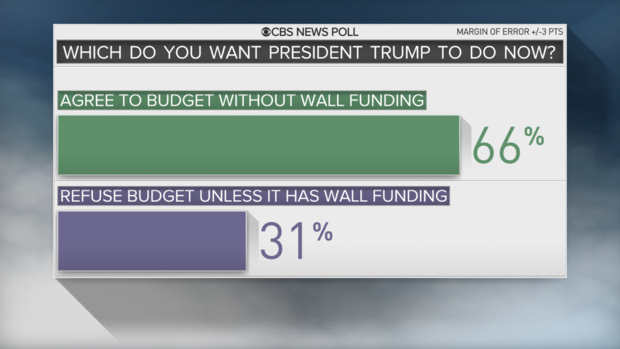
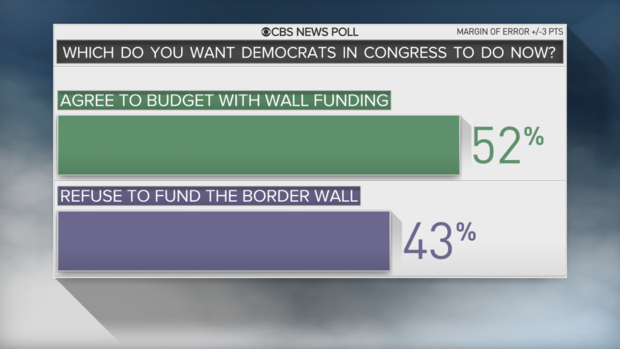
Republicans are more divided than Democrats are on whether the shutdown is worth it.
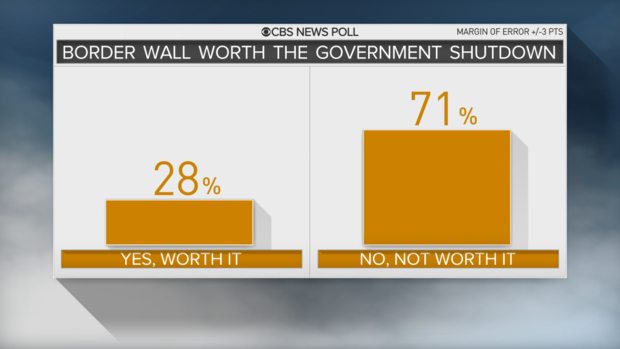
Pelosi is seen as doing a better job than Trump on handling the negotiations over the shutdown. Partisans divide on this, while independents give the edge to Pelosi.
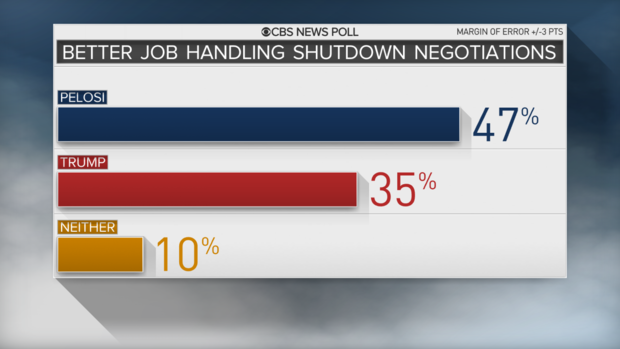
Americans believe the partial government shutdown is having an impact. Six in 10 think it is causing serious problems for the country. Republicans think the shutdown is causing problems, but they are less likely than Democrats or independents to call them serious.
In addition, about 1 in 5 Americans report being personally impacted by the cutback in services or programs caused by the shutdown.
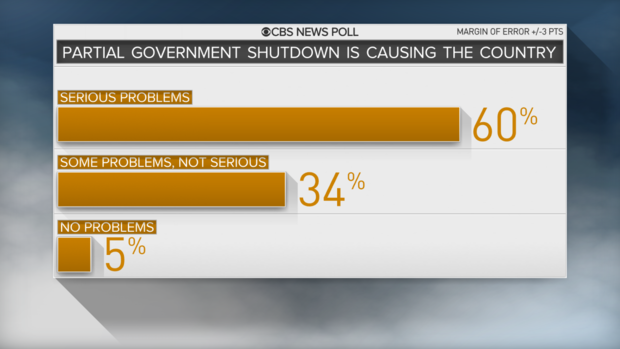
Trump is scheduled to give his State of the Union address Jan. 29. The public is divided on whether he should give his address if the government is still shutdown. Most Republicans (and independents) think he should, while most Democrats think he should postpone it until the government is reopened.
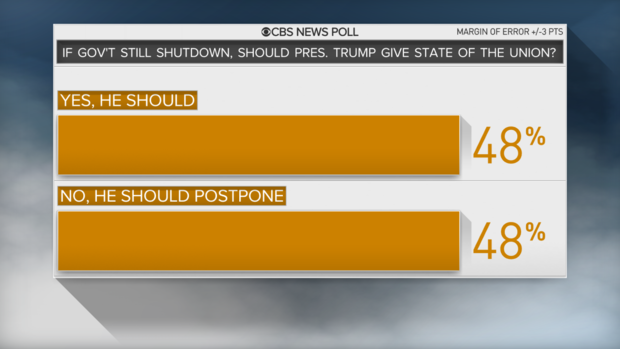
Presidential Job Ratings
Trump's overall approval rating has dipped three points from November to 36 percent today. Fifty-nine percent of Americans now disapprove of the job he is doing – a high for his presidency, although just one point above his previous high. The president's ratings have not varied much over the course of his term so far.
Overall, more Americans say congressional Democrats care about the needs and problems of people like them than say that about President Trump. Most younger Americans, women and racial minorities say Democrats in Congress care about their needs and problems.
On specific issues, the president gets relatively stronger ratings on his handling of the economy and the threat of terrorism. He gets more negative ratings on immigration and health care. The president continues to get high approval from Republicans on these issues.
There is a bit of difference since the fall in the president's overall ratings among some groups that have supported him and voted for him in strong numbers, but these ratings have seen other small fluctuations up and down in the past two years, and many in these groups still think the president cares about people like them.
These groups still think Trump is doing a better job handling the shutdown than Pelosi.
Generally, these groups feel the president is still behind them. Majorities of Republicans, conservatives and whites without a college degree continue to say he cares a lot or some about them. These percentages have changed little since the first year of his presidency.
Leaders in Congress
In evaluating the overall job performance of leaders in Congress, Pelosi gets higher approval ratings than GOP Senate Majority Leader Mitch McConnell, although more Americans are unable to offer an opinion of McConnell.
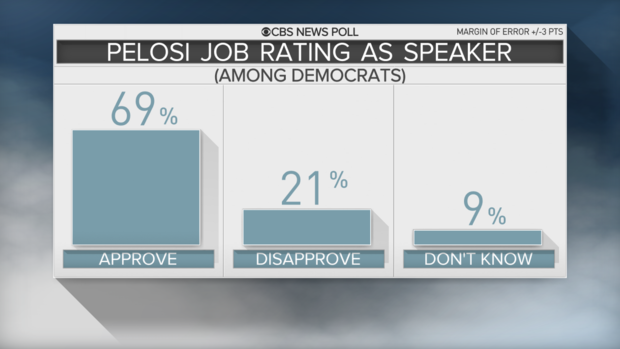
Pelosi gets higher marks from the rank and file in her party, compared to the ratings McConnell gets from his party. About 7 in 10 Democrats approve of the job Pelosi is doing, while just 43 percent of Republicans approve of McConnell.
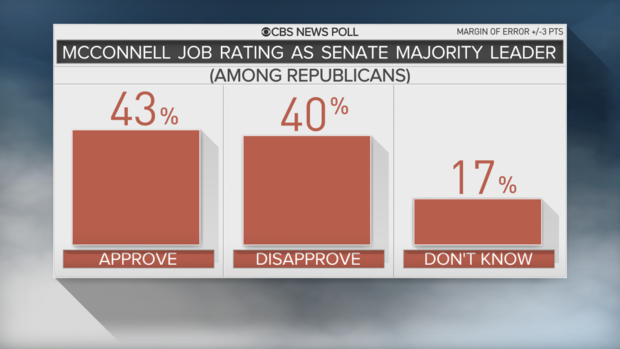
The Economy
Americans continue to have positive views of the nation's economy. Sixty-eight percent say they economy is very good or fairly good. Since early 2017, at least 6 in 10 Americans have held positive views of the nation's economy.
Majorities of both Republicans (89 percent) and Democrats (56 percent) say the nation's economy is in good shape, but Republicans are especially likely to feel that way.
Looking ahead, most Americans are optimistic about the condition of the economy over the next year, although roughly 4 in 10 are pessimistic. Expectations differ little by income, but there are partisan differences.
Eighty-three percent of Republicans (and most independents) are optimistic about the state of the economy over the next year, while 62 percent of Democrats are pessimistic.
-----------------------------
This poll was conducted by telephone Jan. 18-21, 2019 among a random sample of 1,102 adults nationwide. Data collection was conducted on behalf of CBS News by SSRS of Glen Mills, PA. Phone numbers were dialed from samples of both standard land-line and cellphones.
The poll employed a random digit dial methodology. For the landline sample, a respondent was randomly selected from all adults in the household. For the cell sample, interviews were conducted with the person who answered the phone.
Interviews were conducted in English and Spanish using live interviewers. The data have been weighted to reflect U.S. Census figures on demographic variables.
The error due to sampling for results based on the entire sample could be plus or minus three percentage points. The error for subgroups may be higher and is available by request. The margin of error includes the effects of standard weighting procedures which enlarge sampling error slightly. This poll release conforms to the Standards of Disclosure of the National Council on Public Polls.
More Like This
January 23rd, 2019
April 30th, 2025
Top Headlines
August 1st, 2025
August 1st, 2025
July 31st, 2025

